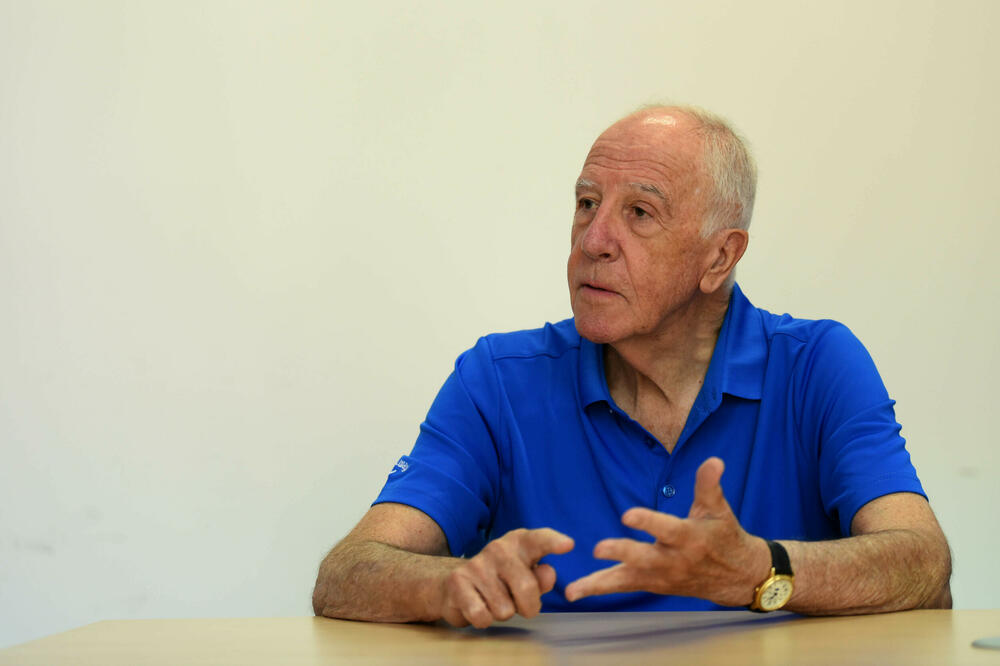It is not helpful if someone from the outside speculates about who should be elected and what kind of government should be formed in Montenegro... If I were still in diplomacy, I would not advise my government to make a statement about who should and who should not be part of authorities, because it is not appropriate and causes resentment.
This is what the former ambassador of Great Britain to the Federal Republic of Yugoslavia (FRY), Sir Ivor Roberts, said in an interview with "Vijesti".
One of the most respected British diplomats served in the FRY from 1994 to 1997. In his biography, it is written, among other things, that during his stay in Belgrade, on behalf of international mediators (Lord David Owen and Karl Bilt), he conducted negotiations with the Yugoslav authorities and the Bosnian Serbs.
About his years in Belgrade, he wrote the memoir "Conversations with Milošević", published in 2012.
In addition to Belgrade, Sir Roberts served in Paris, Madrid, Rome... He retired from diplomacy in 2006, when he became president of the prestigious Trinity College at the University of Oxford. He held that position until 2017.
In an interview with "Vijesta", he spoke about the current political situation in Montenegro and the Balkans, the breakup of Yugoslavia, the EU, Slobodan Milošević, Milo Đukanović, Milovan Đilas...
You are one of the most significant witnesses to the breakup of Yugoslavia, a man who followed that process almost live. However, I come across somewhat conflicting opinions about who is most responsible for the collapse of that country. In numerous interviews and author's texts, you claim that Milosevic is the "undertaker of Yugoslavia", while in your memoirs you still ask whether his role was the most important. Today, more than three decades after those events, do you have a clear answer to the question - who is the main culprit for the breakup of Yugoslavia?
I believe that there are many culprits, but the main ones were Milosevic and (Franjo) Tuđman because of the ideas they had. I think that Milosevic initially saw himself as the new Tito, in terms of control, and then, realizing that he would not succeed, he openly discussed with Tuđman the idea of an essential division of the former Yugoslavia, and especially the division of Bosnia between Croatia and Serbia. Milošević sometimes knew better how to hide what he was up to. Tuđman was brutally honest: he once came to London and actually showed Paddy Ashdown on a map how he saw the division of Bosnia between Croatia and Serbia. Simply astonishing, but I am convinced that he was just being honest and that this was actually the topic of his meeting with Milošević in Smederevo.
There were, however, many factors that contributed to the breakup. There is no doubt that the international community acted incoherently.
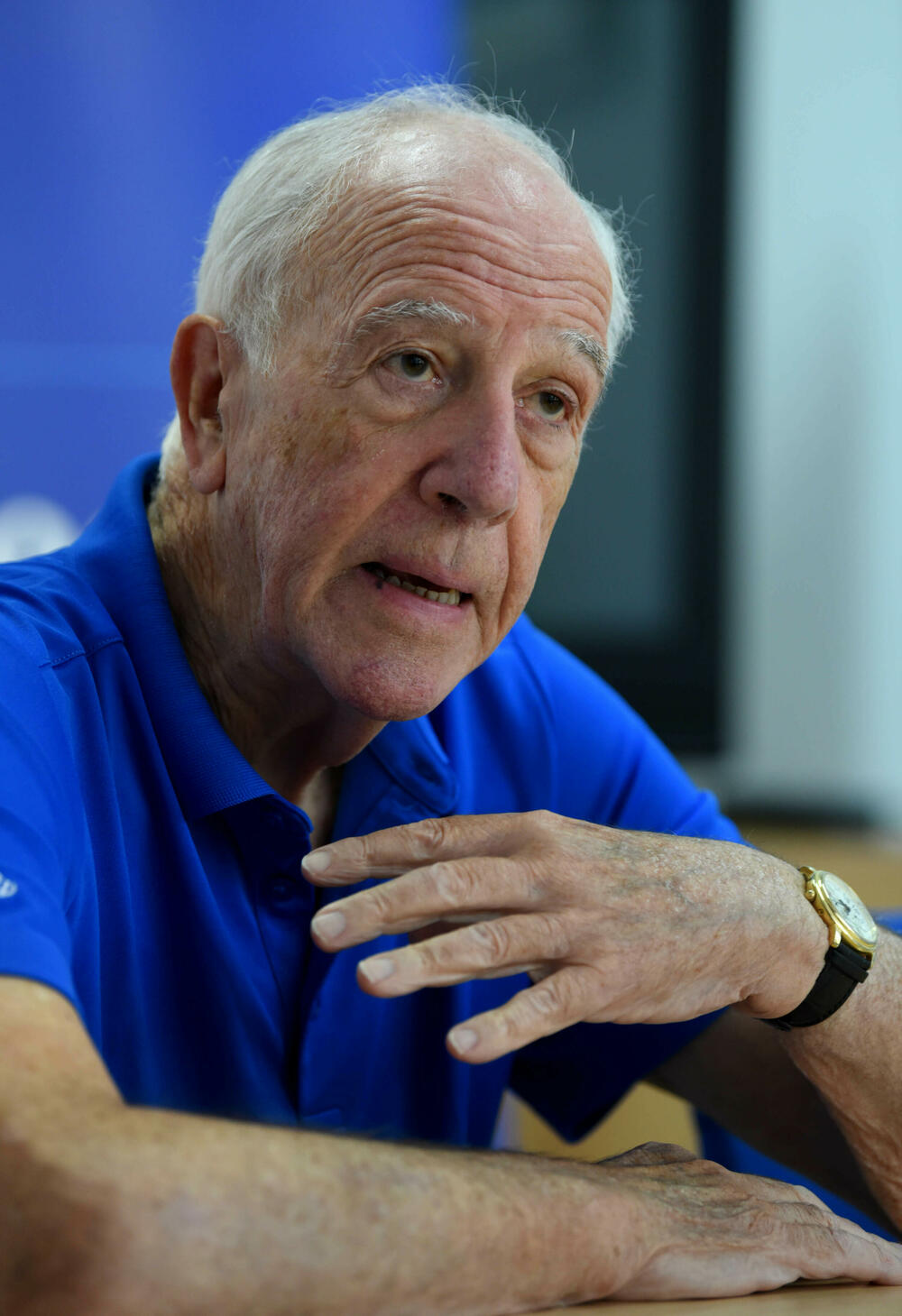
How exactly?
Slates are very different messages. At one point, the idea was: no, the breakup of Yugoslavia is not acceptable because it would lead to a unilateral and violent change of borders, and we should not make any moves that would encourage the breakup. I think it is now clear that Yugoslavia could not survive. Centrifugal forces were too strong, but the separation could be organized peacefully, as in Czechoslovakia, where we had a "plush divorce". I believe that Europe and America could have made more efforts here. But there was a rush, primarily Germany, to recognize Slovenia and Croatia.
How wrong was that decision?
I consider the decision to recognize them without guarantees for minorities, for example, as very bad, which was completely irresponsible. This went against the advice of all the ambassadors in Belgrade, from European countries, as well as the wishes of the Americans. It was against the advice of the UN Secretary-General and Lord Carrington, the EU's special envoy at the time. Negotiations were needed. It was certainly inappropriate to take the position that the maltene process is unstoppable, so let the Germans do their own thing when that's the case. And even after we agreed on the recognition of Croatia and Slovenia, instead of doing it when other European countries did, Germany hurried - so much for European conformity and unity. In my opinion, a terrible decision whose consequences directly led to the war in Bosnia.
You mentioned Milošević, Tuđman, the international community, but what about the role of other Balkan leaders at the time, such as Milan Kučan and Alija Izetbegović?
Kučan was an opportunist. He felt which way the wind was blowing, decided to try his luck and it worked because Serbia was not particularly interested in Slovenia. There were no - or almost no - Serbs there, so it was not expected that they would particularly protest. It is clear that Kučan's actions accelerated the disintegration of Yugoslavia. But I see the fault more with others than with him.
Izetbegović was put in a very difficult position due to the multi-ethnic structure of Bosnia. Obviously, he was extremely worried about the exit of Croatia and Slovenia from the SFRY, because they would be left alone with Serbia and Montenegro. Milošević once told me that he suggested to Izetbegović that he could be prime minister in federal Yugoslavia. But, in all probability, Izetbegović did not see in that promise the security he considered necessary. As far as he is concerned, I think there was a moment when the Cutiljer plan (a peace plan that envisaged the creation of three constitutive national units in Bosnia and Herzegovina, author's note) should have been considered more carefully. But Warren Zimmerman, the American ambassador, answered him. When Izetbegović was in doubt as to whether he should agree, Zimmerman encouraged him to withdraw his signature, which made the situation extremely difficult.
What was Zimmerman's role in the breakup of Yugoslavia? In the book, you stated that Milosevic told you that he regretted the conflict with Zimmerman in 1989, on the occasion of the 600th anniversary of the Battle of Kosovo, in Gazimestan.
I think he was offended by Zimmerman's failure to attend the celebration, which is why he refused to receive him for a year. He told me he saw it as one of his mistakes. It was my last telephone conversation with Milošević before I left the post of ambassador, in which I asked him to look back on the biggest mistakes he made as president of Serbia, and then of Yugoslavia. One of the things he mentioned was just that.
And did Zimmerman have any special involvement in the breakup?
I wouldn't say that it helped that he undermined Cutilier's plan, because it could have avoided more bloodshed. In short, anything that led to more tension, more violence - was certainly not helpful.
In an interview, you said that Yugoslavia could have survived. How? Who were the politicians who could save it?
It could only survive in a significantly different form, with a much looser, confederal arrangement, because without a figure like Tito - who led the country through the world war - it was not possible to continue as before. I also believe that Tito bears part of the responsibility for the suppression of various identities in the former Yugoslavia. One of the Americans, Warren Christopher if I'm not mistaken, described the situation as a covered cauldron. What was under the hood, after Tito's death, came out and showed itself in the form of nationalist parties created in each of the republics.
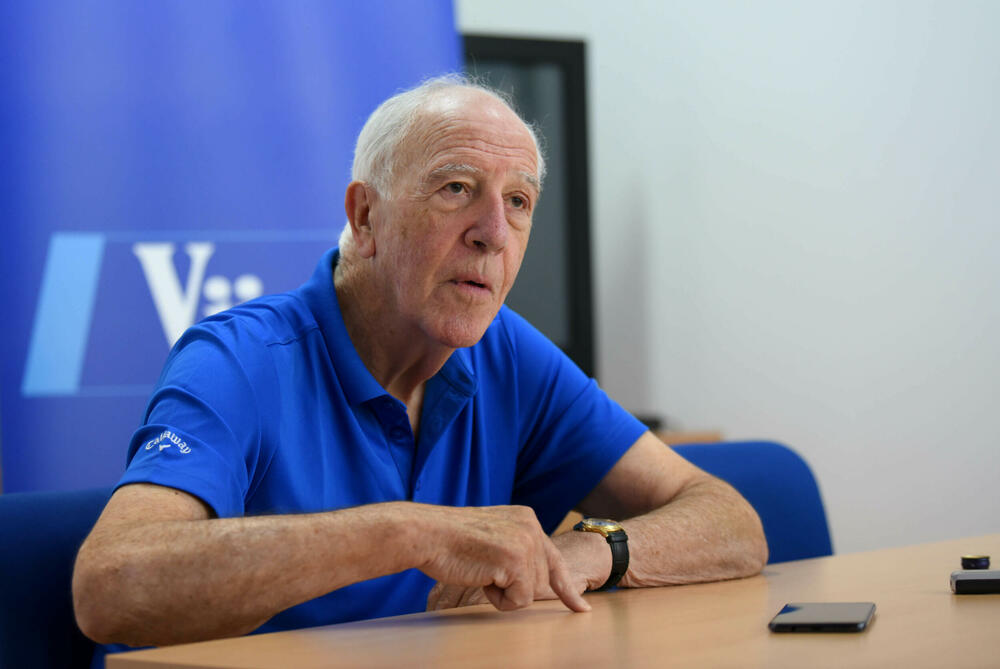
To a certain extent, this could have been avoided if the national identity had been allowed to be expressed in a harmless, cultural way. In Britain, for example, it would be insane to ban the Scots from singing their national anthem, "Brave Scotland." It's just folklore that it would be a huge mistake to ban and nobody in Britain would think it reasonable. But that's how it was here, during communism and Tito's rule.
If Tito had been alive, would he have been able to save Yugoslavia? The eminent German historian Mari-Žanin Čalić, who wrote a book about him, claims that this would not have happened, because the country was in a bad state, if the economic conditions were bad...
True, but not every country that is in a bad economic situation breaks up into seven or eight parts, and even extremely violently. It's not the only option. A loose confederation was an option, given that it was clear that Yugoslavia could not survive in the form in which Tito left it. After his death, the economic situation was certainly made more difficult by the imminent end of the Cold War, with which Yugoslavia lost its geostrategic importance for the West, which until then was in the interest of supporting it economically, as a buffer zone between the Soviet bloc and the West.
So, even if Tito lived another twenty years, he too would have to reckon with that and adjust his reason. I also remember Milošević's sentence that one of the factors that led to the breakup of Yugoslavia was Kardel's (Edvard) constitutional reform in 1974, which he believed had torn the connective tissue of the federation.
Can we even talk about the dissolution of Yugoslavia being over if we keep in mind the current situation in Kosovo and Bosnia and Herzegovina?
I believe that the current borders are final. Territorial corrections, which have been discussed, are probably no longer possible because they imply mutual agreement and peaceful implementation, which I do not see room for in the near future. Borders can be experienced in different ways, and I see them as a means to strengthen people's sense of security. Finally, once you've gained trust in your neighbors, the importance of boundaries somewhat fades - like a band-aid falling off a healed wound. We can see something similar in the Schengen area. In my opinion, it's a model to watch out for. If the entire Western Balkans eventually joins the EU - and I personally see no reason why it shouldn't - then borders would become almost irrelevant.
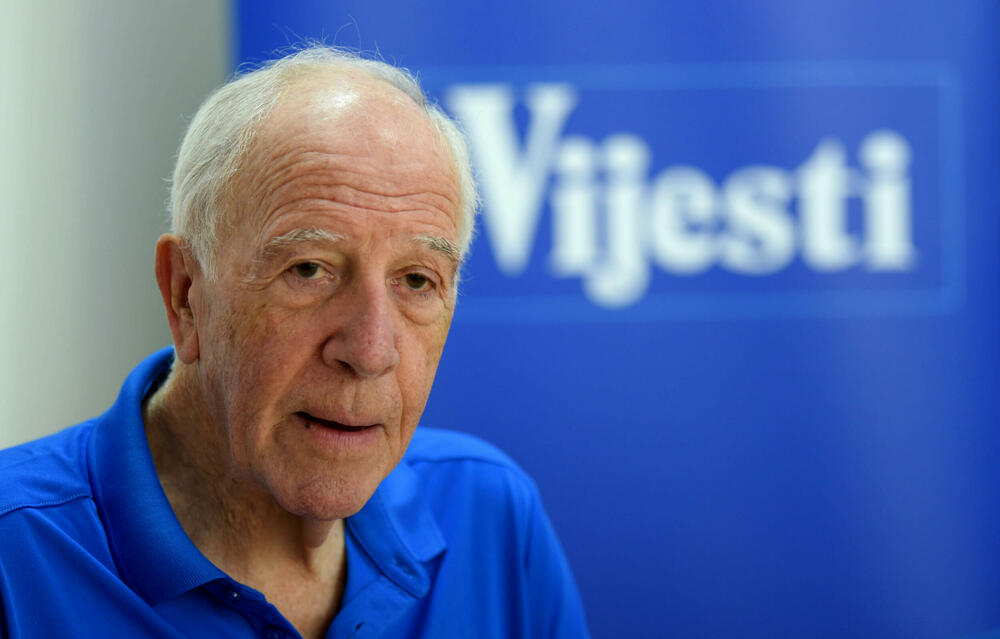
Isn't that assessment, that "territorial corrections are no longer out of the question", partly in collision with your idea about the necessity of holding a new Berlin Congress? You introduced it 11 years ago, saying that "changing the borders in the Balkans would contribute to peace and tolerance". This idea was advocated by some other British diplomats, such as Timothy Less. Are you still at it?
If we are talking about a new congress that would be based on the agreement of all parties - yes, of course. I do not see, for example, an ideological reason that would prevent the exchange of the Preševo valley for the north of Kosovo, provided that all parties consider it a good idea. But even in that case, it is an ephemeral and temporary idea of changing borders. Because, as I mentioned a little while ago, if in the end everyone is in the EU, in an area where borders are erased, then it is no longer essential.
What can be problematic at a given moment, which is the only reason why I still think that a conference could be expedient, are the tensions between the communities. We see that there is still that in the north of Kosovo, there are a lot of tensions in Bosnia as well. It seems incredible to me that we are approaching the 30th anniversary of the Dayton Accords, and there are still open questions. Let's remember Europe, destroyed in 1945, thirty years after the end of the Second World War: Germany in the European Economic Community, a member of NATO, Franco-German reconciliation. Where are the Balkans going wrong? Why can't he go that way?
You mention France and Germany. What do you think about the so-called Franco-German proposal for Kosovo? Do you have the impression that the international community is trying to force Belgrade and Pristina to agree to that plan?
I think the lesson from the Kosovo case is that external actors should be very careful when trying to impose something, if there is no goodwill on both sides. I haven't followed the development of the situation in the last few days because I was on the road. I don't know what the epilogue of the meeting in Brussels called by (Jozep) Borelj is.
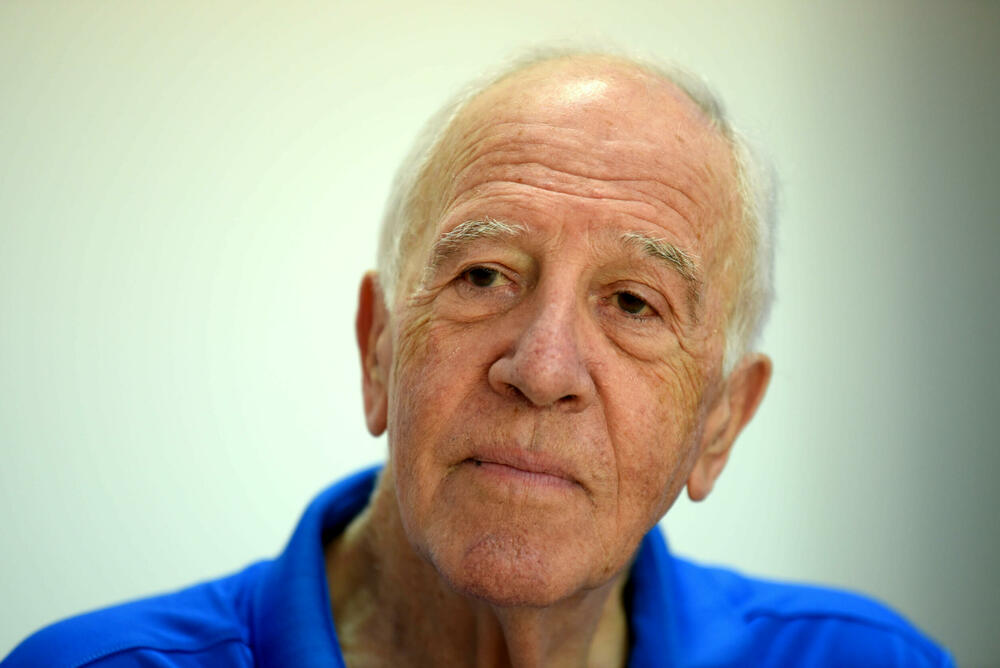
No deal.
That's what I assumed, too bad. The longer this goes on, the harder it will be. I don't see a quick fix on the horizon.
And what about BiH? Two years ago you wrote that the Dayton Agreement may be facing its end. What is the option for that state that will not result in a new war and that will be acceptable to all three constituent nations?
I don't have a magic solution for Bosnia. As I said, it is very disappointing that almost thirty years after Dayton we have an agreement but no resolution, so to speak. We see something similar in the United Kingdom. The Belfast Agreement of 1998 brought peace to Northern Ireland, ending three decades of war. An agreement, therefore, not a resolution, because the communities have not yet been reconciled. They are not on such good terms as the French and the Germans, which is a failure.
In that sense, Dayton was not successful either. I was in Belgrade in 1995 when it was signed, and if I had known that almost thirty years later we would not achieve more in the field of bringing communities together, I would have been deeply disappointed. At that time, however, I was very happy because that put an end to the war in Bosnia. I thought a new chapter was beginning. All in all, a big disappointment.
Do you think that one day the Republika Srpska (RS) will be an independent state?
No, I don't think so. It was not recognized then and will not be recognized now.
Do you think that Dodik is acting in the direction of RS independence?
I wouldn't say, because he knows that would cross every red line. He might have the support of President (Vladimir) Putin, but that would be about it. No matter how much the nationalists in Serbia get carried away with it, they still know that the international community would not give their consent.
One of those who strongly opposes the idea of changing the borders in the Balkans is the recent president of Montenegro, Milo Đukanović. What role did he play in the breakup of Yugoslavia?
I don't think he had any special role. Most of the time I spent in Belgrade, he was the prime minister, so he didn't really deal with foreign affairs. Of course, when he opposed (Momir) Bulatović and became openly critical of Belgrade and Milošević - during the demonstrations against theft in the 1996 local elections in Belgrade and other cities - then he profiled himself as one of Milošević's leading opponents. But, before that, he was not active in the way that Bulatović was in terms of foreign policy.
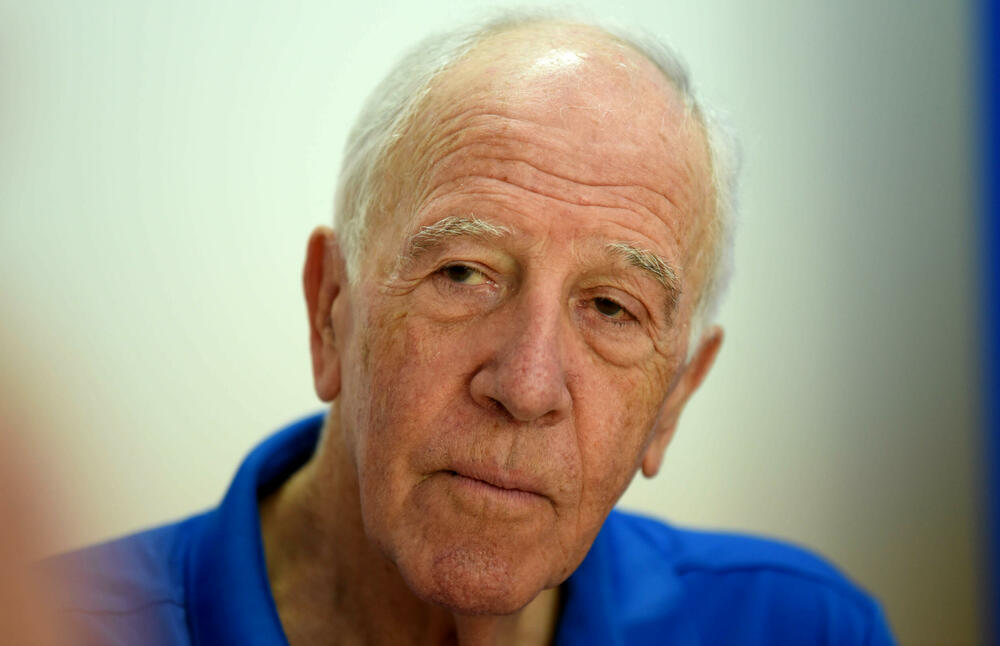
I remember that Milošević told me - I think I wrote about this in the book - that Đukanović claims that he won the elections for the president of Montenegro and that our government supports it. I answered in the affirmative and added that we had international observers who believe that the elections were fair and free, and that is why we support them. Milošević says that he does not share the position. I told him that international observers have their role, as we could see in the local elections in Serbia, which is why we will recognize Đukanović as the regularly elected president of Montenegro.
Not long after, Milošević moved from the position of President of Serbia to the position of President of the FRY, and Đukanović, in his capacity as President of Montenegro, came to the inauguration in the National Assembly in Belgrade, where everyone waited in line after the official ceremony to congratulate Milošević, Mira Marković and their children. Therefore, people would approach Milosevic, send their congratulations, shake hands with Miro, then with Marija and Marko. Đukanović only approached Milosevic, congratulated him, turned and left. Not a word to Mira or the children. It was a big scandal.
Did Great Britain help Djukanovic in any way during his conflict with Milosevic?
We shared a position on the issue of local elections in Serbia. In that sense, it's not that we supported him, but we were in the same positions, he claimed the same as us - that the elections were stolen and should be annulled. Also, as I said, we supported his electoral victory over Bulatović, because the elections were regular according to the assessment of international observers. Later, of course, Đukanović helped the West a lot with Kosovo.
Did Great Britain, like the USA, turn a blind eye to cigarette smuggling that took place through Montenegro in the XNUMXs? The former US ambassador to Serbia and Montenegro, William Montgomery, claims that his country knew about cigarette smuggling...
When it comes to smuggling and smuggling, we couldn't possibly know about it. In fact, the Italians brought an indictment against Đukanović for cigarette smuggling, which we were informed about, but no one smuggled cigarettes into Britain. We had no knowledge of that.
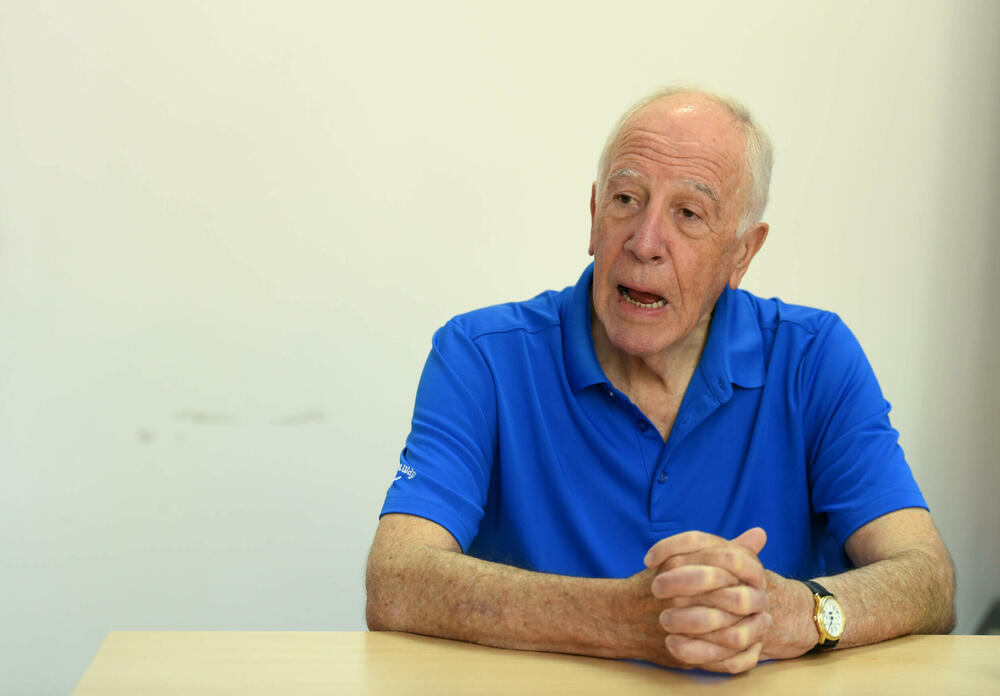
Well, now, during the sanctions, somehow everything was about smuggling. We knew about smuggling across Lake Skadar. We knew that it was being smuggled through the Danube. I mean, you could see it with your own eyes. There was what is called "ant smuggling" at the borders, where people went to Hungary by car, refueled, returned and refueled, and then went to refuel again. Smuggling was a part of life in a way. The international community did not have the resources to follow everything that was happening. People in Serbia and Montenegro were quite skilled at smuggling, because it was necessary for a decent life. But, it is far from the fact that we were looking through our fingers. We actively participated in patrols when there was a confrontation between Milošević and (Radovan) Karadžić and the blockade on the Drina, we monitored cross-border smuggling. That border, however, is almost impossible to patrol without an army of several thousand men, which we did not have.
Today, how do you view Montenegro and its new authorities, which came after the removal of the Đukanović regime three years ago?
Obviously, a new chapter has opened. After thirty years of dominance by one party and one personality, a new leaf has been turned. Montenegro went through all those great chapters under the Petrović dynasty, then the Karađorđević dynasty, then Tito came, and after him Đukanović. Now a new era begins. Independence was, of course, a big step.
By the way, I should mention that when I was the British ambassador in Belgrade, I was accused of promoting Montenegrin independence because I organized our state holiday, the celebration of the Queen's birthday, in Cetinje in 1996. All high-ranking officials attended - Bulatović, Đukanović, (Svetozar) Marović.. In Belgrade, they saw it as a scandal. It's not enough for me to celebrate the national holiday in Belgrade, but I'm also making a celebration in Cetinje. And I did not promote any policy of independence, but I believed that Montenegro and Serbia should solve this issue between themselves. I just wanted to acknowledge the fact that my job description covers Serbia and Montenegro, and that it is not reasonable to expect people from Montenegro to have to travel to Belgrade just to attend the celebration.
Four years ago, in an editorial for Politiko, you criticized Đukanović, saying that he is "a ruler who belongs to the past". Do you see the possibility of his return to power if those who defeated him continue to make bad moves, create unstable governments, etc.?
My definition of democracy is the possibility of changing the government. I see a peaceful change of government as a sign of maturity. Montenegro has experienced that and I think it is good that it is so. Only the Montenegrin electorate should decide the elections. I don't think it helps if someone from the outside speculates about who should be elected and what kind of government should be formed.
Yes, but some diplomats here make statements about who should and who should not be part of the government... Is this a direct interference in the internal affairs of Montenegro and are international actors actually responsible for the current political instability in the country?
If I were still in diplomacy, I would not advise my government to declare who should and who should not be part of the government, because it is not appropriate and causes resentment. Imagine, say, the German government telling another European government who should enter it - people would be rightly outraged. Therefore, I would by no means advise my government to take such an approach. I think that this is a question that only Montenegrin politicians and the people should solve, and I'm sure they will.
I dissuaded Milosevic from Karadzic and Mladic's nonsense
Your memoir "Conversations with Milošević" is a tribute to Milovan Đilas and his book "Conversations with Stalin". Were you and Milosevic like Đilas and Stalin or, since you said that Milosevic saw himself as a new Tito - Fitzroy McClain and Tito?
Better Fitzroy and Tito. (laughs) I met Fitzroy, we were visiting him in Scotland in the summer of 1995. Clearly, he was defeated and disappointed by everything that was happening in Yugoslavia. And I remember, a little later, I was giving an interview to Vremen or some other Belgrade newspaper, when I was asked the question - does Fitzroy McClain still determine British politics? (laughs) I said, Fitzroy McClain is over eighty years old and hasn't been active in government since the 1950s. Anyway, it was fascinating to talk to him.
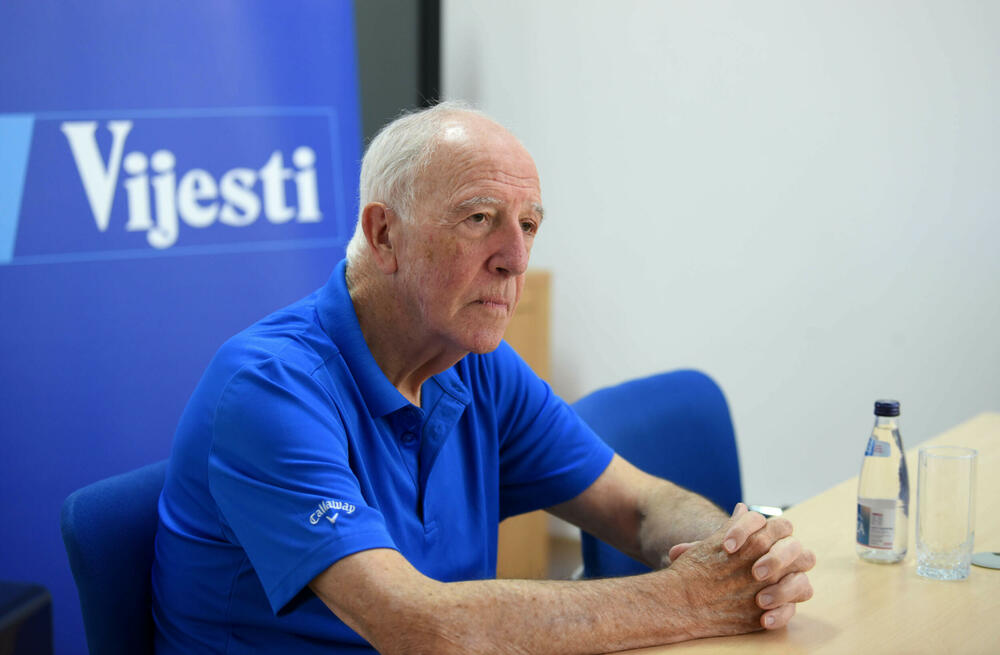
And who was Milosevic?
It wasn't Tito, that's for sure. He had Stalin's cruelty, but also a very narrow view of life. In a way peculiar to him, he dealt with problems only in the short term. It's as if he gets up in the morning, sees what problems are on the agenda for today, without considering the bigger picture at all. He didn't seem to be able to step back and see things as a whole, which of course led to a number of mistakes.
One of my goals in talking to him was to try to bring him back to the bigger picture - how to end the war. Not to deal with another one of Karadzic's or Mladic's nonsense, but to look at the situation beyond that. How to end the war was my main focus. Sometimes I had to repeat the same thing over and over again.
I admire Đilas, he told me about autonomy for Krajina, borders...
What did you learn from Milovan Đilas?
I knew Djilas... I asked him about the borders, about what he thought about the Badinter commission. His answer was that the borders, when they were drawn in Jajce in 1943, were only intended as administrative borders. They were not important, it was thought that they would disappear over time anyway. They are communists, so why should it matter where the borders are? It didn't matter to them, nothing more important than determining where to put the bus stop.
He also told me about Krajina, about the autonomy they were considering for it. They talked about it with Tito, but he didn't like it at all, as a half-Croat, half-Slovene. So they gave up on that idea, figuring that in the communist world it wouldn't even matter, everyone would be brothers.
Do you think some of Djilas' ideas live on today, what is his legacy?
Although a partisan, a communist, Đilas always emphasized that he was a democrat, which lesson is equally important for today. Maybe that's the lesson they should learn in Hungary, where democracy isn't exactly flourishing under (Viktor) Orbán. For the most part, yes, there is a lasting legacy of the ability to stand up and expose yourself to political and personal risk by saying - this is wrong. There is something to learn there. He was the first dissident in communism and he paid dearly for it. An amazing man, I admire him endlessly.
If you say that Ukraine must join the EU, then you cannot reject Montenegro
During the conversation, you said that you don't see why the Balkans should not be part of the EU. Can Montenegro and its neighbors hope for membership in that community soon, given that its officials have recently claimed that expansion is feasible by 2030?
Yes, absolutely.
How?
There are two aspects here - political and technical. As far as the technical side is concerned, Montenegro has fulfilled a lot. He has been considered the most likely candidate for some time, but in the end it is necessary to withdraw political decisions. It is interesting how politics can overrule technicalities, because now it is clear that firmly linking Ukraine with at least one of the key Western institutions is at the top of the list of Western priorities. It is unthinkable for Ukraine to join NATO while part of its territory is under Russian occupation, because that would practically go to war with Russia... The issue of NATO membership cannot be actively considered until the war ends and Ukraine win.
But the EU is something completely different. Recently, in her State of the Union speech, Ursula von der Leyen spoke quite positively about enlargement, considering both the Western Balkans and Ukraine. If you say that Ukraine, which did not have the possibility of accession negotiations, and therefore lags behind a country like Montenegro on many issues, must become a member, then it would be unacceptable to reject Montenegro just because it needs to fill in a few more fields in the form. That is why it seems to me that the political need to do something for Ukraine could also create a chance for the Western Balkans, especially Montenegro, which is already a member of NATO, without territorial disputes, aligned with the Western course regarding Kosovo and the war in Ukraine.
Also, the admission of Montenegro could not disturb the balance. We are not talking about Turkey, with millions of people, but about 620 thousand, which would hardly change the way of voting. It would be completely painless for the EU, and the procedures would be followed. This would at the same time send a signal to the Western Balkans - you may not be ready yet, but there is a realistic prospect, we have accepted Montenegro, and we will accept you as soon as you take the necessary steps. The other day I read an interview with the German ambassador to Montenegro, Peter Felten, where he says that he does not see any reason why Montenegro should not join the EU in two years. I agree with that.
Bonus video:



